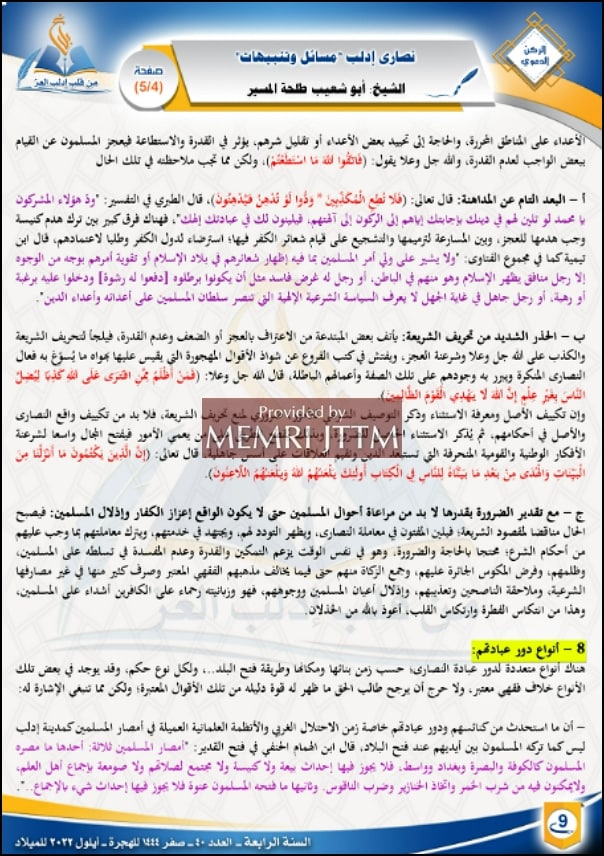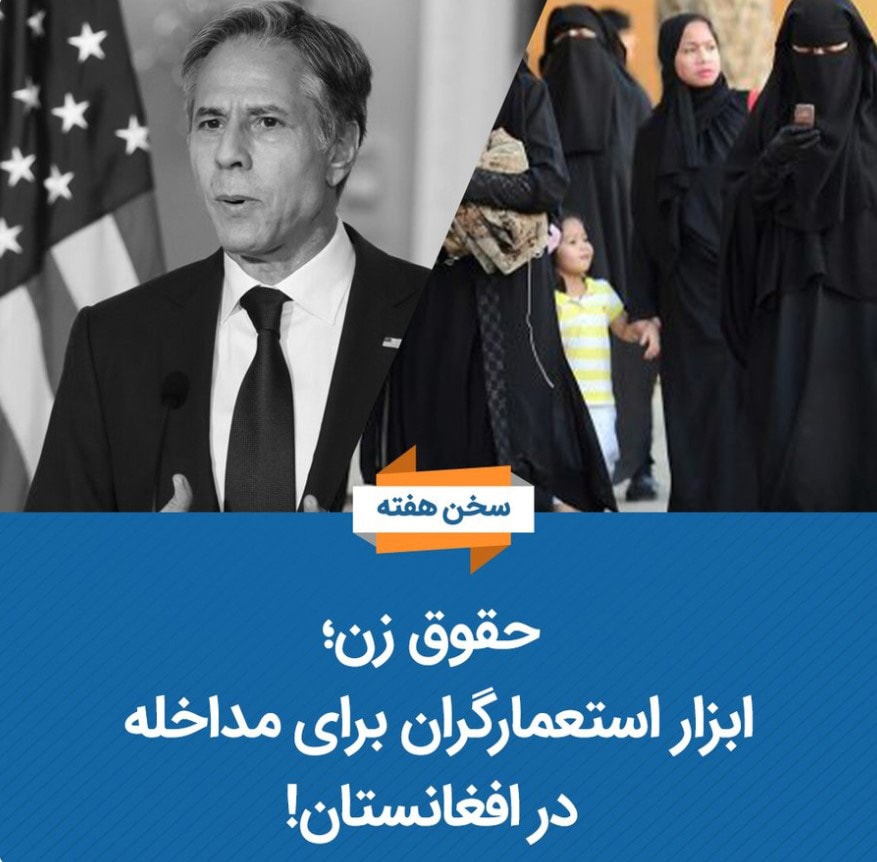The following report is now a complimentary offering from MEMRI's Jihad and Terrorism Threat Monitor (JTTM). For JTTM subscription information, click here.
On August 28, 2022, Syrian Christians in Al-Ya'qoubiyah Village near Jisr Al-Shughour, west of Idlib, held a ceremony in the village church for the first time in ten years. The event sparked harsh criticism from jihadi clerics who claimed that Hay'at Tahrir Al-Sham (HTS) permitted the ceremony as part of its efforts to ingratiate itself with the West, and that it protects the Christians more than it protects the Muslims.

For example, Idlib-based lawyer 'Isam Al-Khatib criticized HTS leader Abu Muhammad Al-Joulani, writing sarcastically on Telegram: "Now I understand you, Joulani. You wanted to open a branch of Rome in the liberated areas. The pope is very happy with you."[1]

And also on Telegram, independent Syrian jihadi cleric Abu Yahya Al-Shami posted a message said to have been received from a fighter at the front who lashed out at HTS, asserting that it does not collect the jizyah (the tax imposed on non-Muslims) from Idlib's Christians, because it claims that it is unable to protect them, but at the same time collects taxes from local Muslims."[2]
In response to this criticism, the HTS-affiliated administration of the Jisr Al-Shughour region published a "clarification," in which it contends, among other things, that the church in question is hundreds of years old and was closed by "the criminal [Syrian] regime," and that the residents of the area are "part of the society and they have rights." However, the administration stresses that the reports about the controversial ceremony that was held at the church were released without prior coordination and with disregard for "the general policy."[3]

Apparently this response did not mollify the opponents of HTS. A wide-ranging article by Egyptian-born Talhah Al-Musayyar, a Syria-based jihadi cleric also known as Abu Shu'ayb Al-Masri, which appeared on September 5, 2022, in the Balagh monthly magazine published by independent, anti-HTS jihadi clerics in the Idlib region, asserts that the Christians in Syria "betrayed the Muslims and are corrupting their virtues," and goes on to say that they are not worthy of the protection that they receive from the Muslim majority and they should not be granted freedom of worship in the churches.

The recent controversy is another in a series of incidents that have occurred over the past year, in which the HTS treatment of the Christians in the areas under its control was criticized by jihadi clerics. For instance, during February 2022, anti-HTS Telegram channels alleged that HTS intended to open a church in Idlib City,[4] and in July 2022, Al-Joulani paid a visit to the Christians,[5] and both these incidents sparked harsh criticism of HTS and its leader among opponents of HTS.
The following are translated excerpts from the article in Balagh by Abu Shu'ayb Al-Masri:
The Christians 'Betrayed The Muslims And Corrupt Their Virtues;' The Treatment Of Christians By The Local Factions Is Dictated By 'Personal Interests' To Gratify The West
Titled, "The Christians in Idlib – Questions and Comments," the article opens with a description of the background that led to its writing, which, Al-Masri explains, was the "gathering of several of the Christians of Idlib" which was held even though the holiday which prompted their convening had been "abandoned ever since the area was liberated, because of their [the Christians'] exodus from the liberated areas." He adds that, "Only very few Christians remained in the areas where they had lived in the past." The local media was rife with photographs and videos of the event which documented "their unbeliever ceremonies with the participation of women dressed immodestly."
The jihadi cleric goes on to review the historical background of the Christians in Syria, and asserts that the members of the community, "betrayed the Muslims numerous times," especially during the Crusader wars, the Tatar invasion, the French and the British occupation, as well as under "the current secular governments." He contends that the Christians advanced "deviant schools of thought brought to Syria by the Western occupation," and ideas which oppose Islam, for example the concepts of Ba'thism, pan-Arabism, and socialism. Furthermore, he contends, they maintain their relations with the West, continue to call for the establishment of non-Islamic regimes, and play an essential part in the missionary efforts in Syria, and contribute to a great extent to "the corruption of the Muslims' morality and their religion."
Al-Masri claims that calling on Christians to adopt the religion of Islam is "among the most important tasks of the Muslim community," and complains that the way that "the local councils and the administrations of the factions" treat the Christians in the Idlib area is dictated by "personal interests which demand the gratification of the Christians in the West." This situation is worsening, he writes, in light of the voices urging that the members of the Christian community who abandoned the region in the past should be brought back.
The Christians Do Not Consider Themselves 'Dhimmis' So They Don't Deserve The Protection Afforded By That Status
The Syria-based jihadi cleric contends that since the Christians in Syria do not consider themselves to be dhimmis (non-Muslim subjects under the protection of Islam), and thus do not pay the jizyah, they should be viewed as those who have violated the "dhimmah covenant" (the covenant of protection provided to dhimmis who pay the jizyah), and the protection that they would receive if they had that status, and which they are nonetheless benefiting from now, should be revoked. He further states that those Christians who chose to leave the region of their own accord and to settle in Dar Al-Harb (a term that refers to the enemy's land or a disbelieving country) – in other words, those who emigrated to an area that is under the control of the Syrian regime – should also be considered as having broken the dhimmah covenant, with all attendant implications, and how much more so if they are fighting against Muslims, alongside the enemies of Islam, or incited the unbelievers against the Muslims.
Al-Masri notes that during the years of the revolution in Syria, "elements in the local governments" permitted the Christians to live in the "liberated areas" and even granted them various services and security, and they did this without clarifying the attendant conditions. In this context he stresses that the condition for providing security and protection to the Christians is that the members of the community abide by a series of rules, first and foremost: not to harm the Muslims, not to spy on them, not to slander Islam, not to hold "unbeliever ceremonies" in public, and more. Any who violate these rules, he claims, should have the protection that they enjoy revoked and should be punished, in accordance with the laws of Islam.
Despite The Constraints Dictated By Reality, The Christians Should Not Be Pandered To Or Strengthened At The Expense Of The Muslims
The jihadi cleric admits that the treatment of the Christians is also influenced by several constraints dictated by reality. He writes that, "The Christians in Syria receive aid from the nations of unbelief which use them as a pretext for involvement in the Muslims' affairs, to exert force on them, and to blackmail them. This is because of the weakness of the Islamic nation, the onslaught of the enemies on the liberated areas, and the need to neutralize some of the enemies or to limit their negative affect." He states that this situation also restricts the ability of the Muslims to take the required steps regarding the Christians who live on their territory.
However, Al-Masri asserts that despite the constraints described above, several rules must be adhered to, starting with a complete avoidance of trying to ingratiate oneself with the Christians. For example, he maintains that there should be no rush to reconstruct churches that were destroyed in the past and to hold "unbeliever ceremonies" in order to find favor with "the countries of unbelief;" that one should beware of "distortion of the shari'a," and granting religious legitimacy to deviant and anti-religious ideas, such as nationalism and pan-Arabism; that one should avoid turning things on their heads, to the extent that the Christians are strengthened at the expense of the Muslims, contrary to the intentions of the shari'a, and avoid the demonstration of merciful treatment toward them while humiliating the Muslims and treating them harshly.
The Churches In Idlib Were Established Under Western Occupation And Secular Regimes, In Areas With A Muslim Majority – Therefore They Should Not Be Permitted To Function
Regarding churches and other Christian houses of prayer, the jihadi cleric asserts that there is no disagreement about the fact that those among them that were established "during the occupation by the West and the secular collaborator regimes in the Muslim cities, such as in the city of Idlib" – should not now be permitted to house prayers and ceremonies. In a concrete example, with respect to the church in Al-Ya'qoubiyah Village, west of Idlib, where the controversial ceremony was recently held, Al-Masri notes that while it's true that several clerics oppose harming churches located in areas where all the residents are Christians, regarding that specific village, even if in the past it was a Christian village, he points out that today it has a Muslim majority and a very small Christian minority.
Al-Masri adds that during the Islamic occupation of the region, most of the residents of Syria were Christians and they had many churches and houses of prayer, however, over the course of history many of them converted to Islam, moved to Dar Al-Harb territories and violated the "dhimmah covenant." As a result, the number of churches in the area dwindled and "the assumption according to which they should be left as they are, in the name of Islamic tolerance, despite the change in circumstances, is no longer a valid assumption."
In conclusion, the jihadi cleric writes that while it's true that the treatment of Christians in the "liberated areas" is influenced by undeniable constraints, an erroneous assessment of these constraints "weighs heavily on the Muslims and strengthens the handful of polytheistic Christians who remain." He adds that even in Europe and the U.S., "Numerous churches are sold and transformed into mosques – and so what is this strange insistence on reconstruction of every abandoned monastery or evacuating refugees from a house that was once part of a now-abandoned church?"
[1] Telegram, August 30, 2022.
[2] Telegram, August 31, 2022.
[3] Facebook, September 3, 2022.
[4] See MEMRI JTTM Report: Anti-HTS Telegram Channels: Al-Joulani Is Opening A Church In Idlib In An Appeal To The International Community, February 28, 2022.
[5] See MEMRI JTTM Report: Hay'at Tahrir Al-Sham (HTS) Criticized By Opponents For Leader Al-Joulani's Appearance With Local Christians, July 20, 2022.
The full text of this post is available to subscribers.
Please login or register to request subscription information from MEMRI




